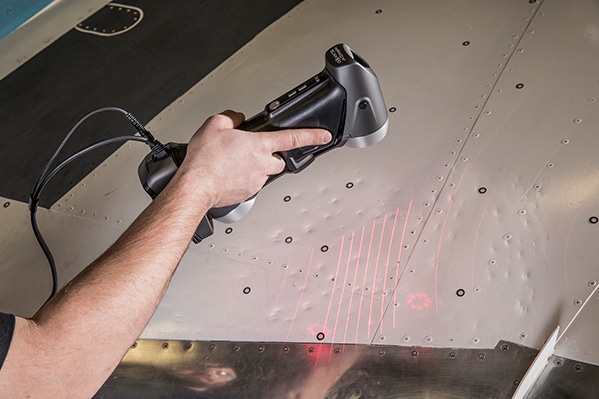
Image Credits: Ametek
Creaform, a worldwide leader in portable and highly accurate 3D measurement solutions and engineering services, announced today that it will extend its expertise in non-destructive testing (NDT) to the aerospace industry. By expanding access to its inspection solutions, the company aims to better enable airlines, as well as maintenance, repair and overhaul (MRO) service companies, to more efficiently perform the evaluations of in-service aircraft safety, while cutting costs and saving downtime.
As predictive maintenance becomes more prominent, aviation maintenance professionals and aircraft MRO providers are increasingly on the lookout for innovative methods that enable quicker and safer decisions to be made on the outcome of part defects. The mapping of external surface defects on aircraft parts, which can prove difficult to obtain using traditional methods—namely hail damage, bird impacts and lightning strikes on the fuselage and wings—can be assessed with 3D scanning. When paired with advanced inspection tools, such solution cuts down on the operator’s impact on measurements, shortens time to get the final report, and reinforces decision-making.
Steeves Roy, NDT Product Manager, Creaform
To ensure that the solution matches aviation maintenance industry requirements and properly reflects the market needs, Creaform is partnering with major aircraft manufacturers for beta testing. The surface inspection solution for MRO service companies in the aerospace industry is set for release in October 2017.
Earlier this year, Creaform announced that the HandySCAN 3D metrology-grade laser scanner had made its first major step into the aerospace industry. It was added to the Airbus Technical Equipment Manual (TEM) which is referenced in the Airbus Structure Repair Manual (SRM).
Well-known for its NDT solutions for the oil and gas industry, Creaform’s NDT product solution is comprised of its flagship HandySCAN 3D™ portable metrology-grade 3D scanner and its Pipecheck™ NDT software, both of which allow automatic on-site inspection, detection, and characterization of pipeline defects. With traceable and repeatable inspection data and results, operators can access critical information for making safer decisions.